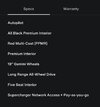They still do this to folks who re-enable supercharging via external means on salvage vehicles. It appears to be a manual process from what I can tell. The superchargers themselves have a somewhat limited connectivity (which is why the majority of the billing and such is actually handled by the car side, interestingly enough)... my guess is that they have to kind of go out of their way to trigger this, and likely can only do so at specific stations.
The last case I know about is a guy with a salvage that had someone else (not me) re-enable supercharging and disconnect from Tesla, and was basically just local supercharging all the time. Eventually they shut him down from the charger side and triggered the disable flag.
On the technical side, this actually doesn't have to be done digitally with a programmed command, per se... I tried blocking this ability with modified firmware, but they basically make the supercharger intentionally fail a particular test the vehicle does for safety that causes the car to believe that the onboard fast charge equipment is faulty and it disables it for safety reasons. And the actual fault detection code is worth keeping for actual safety reasons.
It's actually quite a clever way to get the unconnected car to do what they want without really
commanding it to do anything. Might even be more "legal" than reaching in and disabling supercharging on the vehicle itself remotely like they generally do.
IANAL, but I firmly believe Tesla modifying vehicles they do not own to remotely remove functionality without explicit permission from the owner is outright theft, no different than if they physically stole your wheels or similar... but in the few instances I know of where anyone attempted to fight them on this on a legal front they've eventually come to an NDA'd settlement of some kind. Makes me feel pretty confident if it made it to court they would lose big time.
It's also ridiculous that they're opening up the supercharging network to third parties (in Europe so far at least), in which case who knows what they're charging and how safe it is... but still won't let salvage Tesla's with superficial damage, or otherwise completely safe and repaired vehicles, use the superchargers under the guise of a safety concern.

Are they saying Tesla's are less safe charging than the competition?!
Are they saying Tesla's are less safe charging than the competition?!



